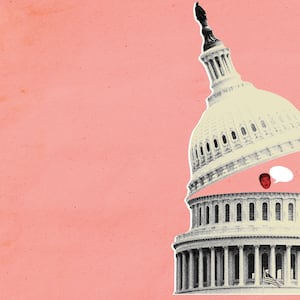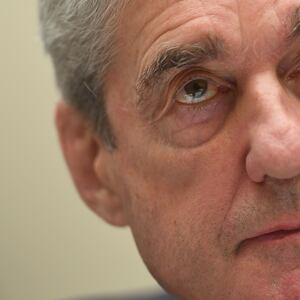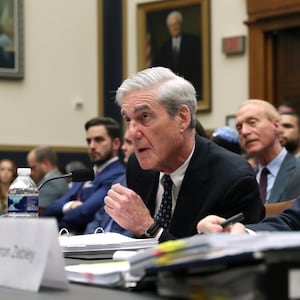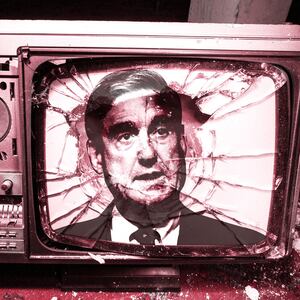Special Counsel Robert Mueller told Congress on Wednesday that he did not exonerate President Trump and that he could, in fact, be indicted after he leaves office. And he hinted that he believes Trump’s written answers to questions may have contained falsehoods.
In a curt exchange with Colorado Republican Rep. Ken Buck, the former special counsel said the Justice Department’s legal rules don’t shield Trump from criminal charges after he’s out of the White House.
“Could you charge the president with a crime after he left office?” Buck asked.
“Yes,” Mueller replied.
“You believe that he committed––you could charge the president of the United States with obstruction of justice after he left office?” Buck asked.
“Yes,” Mueller replied.
House Judiciary Committee Democrats, including Rep. Jamie Raskin, nodded excitedly through the exchange—the closest Mueller came to explaining the significance of his refusal to exonerate the president in his report on Russian interference in the 2016 election and possible obstruction by the White House. It followed a similar, shorter exchange earlier with the Democratic Judiciary chairman, Rep. Jerry Nadler.
Mueller’s testimony had something for everyone—and something to upset everyone.
The former special counsel refused to read portions of his report aloud and wouldn’t say if he would have charged the president if Justice Department DOJ rules had allowed it; at one point, he inadvertently said he would have charged the president, but then corrected himself later.
Democrats hoping for viral drama were disappointed.
But Mueller’s testimony wasn’t without substance: H; he blamed Trump for boosting Wikileaks’ illegal activity and said the Kremlin is already looking to interfere in the 2020 election.
He torpedoed two of Trump’s favorite lines.
Nadler asked Mueller if it was true that his report did not clear the president of obstruction of justice. Mueller answered, “Correct—it is not what the report said.”
“What about total exoneration?” Nadler asked, referring to a phrase the president has tweeted many times. “Did you actually totally exonerate the president?”
“No,” Mueller replied.
He also confirmed that Trump refused to sit for an interview with his team and explained that he did not subpoena Trump because such a move would get tied up in time-consuming litigation.
Rep. Val Demings (D-FL) asked about Trump’s written answers to Mueller’s questions.
“Isn’t it fair to say that the president’s written answers were not only inadequate and incomplete—because he didn’t answer many of your questions—but where he did that his answers showed he wasn’t always being truthful?” Demings asked Mueller.
"I would say, uh, generally," Mueller replied.
Republicans, meanwhile, looked to damage Mueller’s credibility and paint him as a partisan. Herefused, for the most part, to engage with their critiques.
In back-to-back hearings that unspooled over seven hours, Mueller spoke slowly, and his speech was sometimes halting—which his critics seized on in social media posts and television appearances
In one back-and-forth, he had to ask the fast-talking Georgia Republican Rep. Doug Collins to repeat himself multiple times. He consulted the report throughout questioning, often pausing to scrutinize the book-length document.
In his exchange with Collins, he struggled to explain how his report distinguished between conspiracy and collusion. And at one point, he called the president “Trimp” instead of “Trump”––a verbal slip-up that damaged what could have been a valuable video clip for Democrats.
As the first hearing neared its close, The Daily Beast texted Republican Rep. Matt Gaetz—one of Trump’s top Congressional allies—for his view of how it was going. “For Democrats?” Gaetz wrote, and then sent a gif of a mushroom cloud.
In one tense and awkward moment, Mueller opted not to defend himself against. Rep. Louie Gohmert. A famously bombastic Republican from Texas, Gohmert laid into Mueller over his handling of the anti-Trump texts one of his investigators, Peter Strzok, sent to another FBI employee with whom he was having an affair. Gohmert, raising his voice, told Mueller he had “perpetuated injustice.” Then Gohmert’s time ran out, and Nadler told Mueller he could reply to the incendiary accusations. But he didn’t.
“I take your question,” Mueller said, and left it at that.
One new tidbit of information came out in Gohmert’s questioning, though: Mueller said that when he met with Trump in early 2017 about his search for a new FBI director, he was not a candidate for the position. Trump has long maintained—and tweeting during the hearing—that Mueller tried to get the job and resented Trump for not hiring him.
In moment after moment throughout the hearing, Mueller refused to throw political bones to Democrats. A striking instance came when Rep. Hakeem Jeffries, a member of House Democratic leadership, pressed him on whether or not the president could be charged with obstruction of justice.
“Those are the elements of obstruction of justice,” Jeffries said, after describing how Trump ordered the White House Counsel to fire Mueller. “This is the United States of America. No one is above the law. No one. The president must be held accountable one way or the other.”
Mueller didn’t buy it––sort of.
“Let me just say, if I might, I don't subscribe necessarily to your––to the way you analyze that, I'm not supportive of that analytical charge,” he said, without elaborating.
Mueller also refused to read aloud from his report, another disappointment to Democrats who had hoped such moments could create viral video clips. When Rep. Ted Lieu, a firebrand California Democrat, asked him to do so, he refused.
“I’m happy to have you read it,” Mueller said with a smile.
In that same exchange, Mueller indicated to Lieu that he would have charged Trump if not for a DOJ rule barring the prosecution of sitting presidents. But in the opening statement of the second hearing, this time before the House Intelligence Committee, Mueller corrected himself and said he did not make a charging decision either way because of the rule.
There were few decorum-breaking moments during the first of the two hearings, but there were some groans. When Rep. Debbie Lesko (R-AZ) attempted to make the point that Mueller’s findings were informed by the media—by comparing citiations of the New York Times, the Washington Post, and Fox News clips—Democrats smirked and rolled their eyes.
Mueller himself, long portrayed as the picture of stoicism, did show some flashes of emotion. Cut off by Rep. Ben Cline (R-VA), he slightly rolled his eyes, exasperated. He raised a finger to begin countering Rep. Mike Johnson (R-LA) accusation of bias toward Democrats, but Johnson continued with a four-minute monologue slamming Democrats and his investigation.
Even before the first hearing began, the atmosphere in 2141 Rayburn on Wednesday morning matched the immense hype. Perennially late lawmakers were in their seats long before Mueller arrived in the room, chatting, joking, and in at least one case, literally biting their nails.
One of Mueller’s chief antagonists—Rep. Mark Meadows (R-NC), the chairman of the right-wing House Freedom Caucus, who does not sit on the committees that would question Mueller—sauntered into the room and took a seat in the audience, just a few feet behind the former special counsel.
While other GOP lawmakers tried and failed to get a seat in the room, Capitol Hill interns and members of the public waited overnight, sleeping in the marble hallways of Rayburn to make sure they snagged one. One seat opened up quickly when a man with his hair in a bun and a checkered keffiyeh started shouting about encrypted messages and Trump Tower Moscow as soon as Mueller entered; he was immediately escorted out by police.
As she walked into a room packed full of lawmakers, press, and cameras, Rep. Debbie Lesko, a freshman Republican from Arizona, succinctly summed up the vibe.
“This,” she said, “is a bit insane.”
The Capitol Hill doubleheader was the culmination, and all-but-certain conclusion, of Mueller’s work as special counsel—a job that started more than two years ago at a moment of extraordinary national tumult.
After the Intelligence Community released an assessment in January 2017 that the Kremlin interfered in the 2016 election to try to help Trump win, then-FBI Director James Comey revealed that the bureau was scrutinizing Trump World’s Russia ties. The disclosure enraged Trump, who then fired Comey, sending the Justice Department into emergency mode.
Attorney General Jeff Sessions had already recused himself from the Russia probe because of his role on Trump’s campaign. So Deputy Attorney General Rod Rosenstein, who was supervising the probe, named Mueller as special counsel and directed him to take it over. (Rosenstein told The Daily Beast he did not watch Mueller’s testimony. “I am out of town on a road trip with my family. I already read the report. I am not watching the hearing. America is still here outside the beltway.”) Mueller soon assembled a team of prosecutors and investigators to comb through all things 2016.
Naturally, controversy ensued. Republicans pointed to the fact that some members of Mueller’s team had donated to Democratic campaigns, and to the controversial career of Andrew Weissmann, a top Mueller deputy. And congressional committees opened parallel probes, questioning witnesses, subpoenaing documents, and swimming in their own seas of controversy.
Over the next two years, Mueller plowed away. He questioned hundreds of witnesses and issued thousands of subpoenas. By the time he called it quits, his team had indicted more than 30 people and secured a host of guilty pleas, including from the president’s former National Security Advisor Michael Flynn and from George Papadopoulos, a foreign policy advisor to the Trump campaign. Longtime Republican operative Roger Stone is facing charges. And Paul Manafort, Stone’s former business partner and Trump’s former campaign chief, is serving a four-year sentence for crimes committed before the election season.
Mueller also charged a host of Russian nationals with breaking laws to influence the election. He zeroed in on the Internet Research Agency, a government-backed troll farm whose workers impersonated Americans to spread incendiary viral content via Facebook and Twitter. The trolls even organized real-life political rallies in the U.S., according to the report Mueller would later release.
The special counsel also farmed out a host of cases to different U.S. attorney’s offices, including a probe of the president’s inaugural committee.
After concluding his investigation, Mueller submitted a report on his work to Attorney General Bill Barr. Barr then released a brief letter downplaying its contents, which Mueller privately blamed for spreading “public confusion.” Members of Congress demanded the report’s immediate release, but it was several weeks before Barr, after putting it through a rigorous legal review, made it public—minus some redactions. But before the report dropped, Barr gave an unusual press conference that was widely viewed as an effort to spin the document in the most favorable way for the administration.
“President Trump faced an unprecedented situation,” Barr said at the press conference, appearing to defend Trump’s efforts to shutter Mueller’s probe. “As he entered into office, and sought to perform his responsibilities as president, federal agents and prosecutors were scrutinizing his conduct before and after taking office, and the conduct of some of his associates. At the same time, there was relentless speculation in the news media about the president’s personal culpability. Yet, as he said from the beginning, there was in fact no collusion.”
The report detailed a host of contacts between Russian nationals and the Trump campaign, as well as efforts by third parties to set up talks. Mueller found no evidence that denizens of Trump World conspired with the Russians who interfered in the election. He left the door open, however, to the possibility that Trump broke the law by obstructing justice. And his report detailed a host of steps Trump took to interfere with Mueller’s work, including multiple efforts to get subordinates to fire the Special Counsel.
Despite those moves, Mueller did not charge Trump with a crime. Explaining his decision, he pointed to a Justice Department legal finding that concluded prosecutors cannot charge sitting presidents with a crime.
“[I]f we had had confidence that the president clearly did not commit a crime, we would have said so,” Mueller said in his only public statement on the probe, at a question-free press conference.
“We did not, however, make a determination as to whether the president did commit a crime.”
The subtext: The ball is in Congress’s court. Mueller’s done.
This story has been updated to correct a mischaracterization of the nature of third-party outreach to the Trump campaign.











